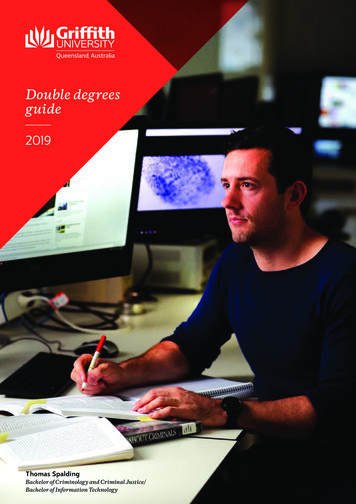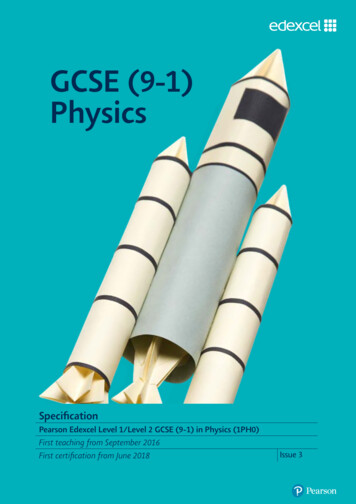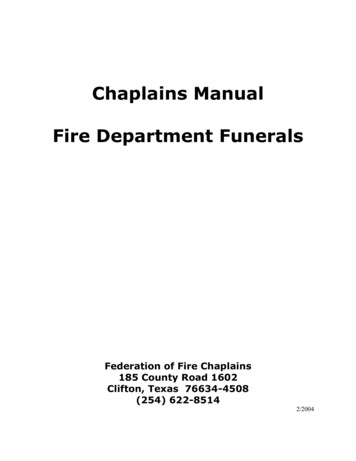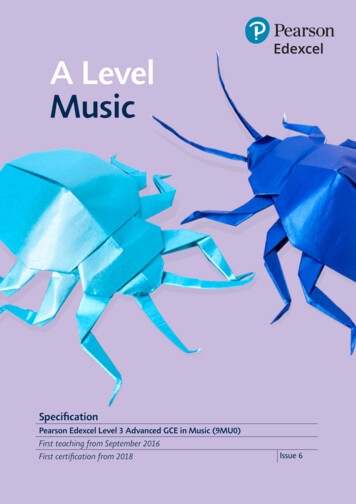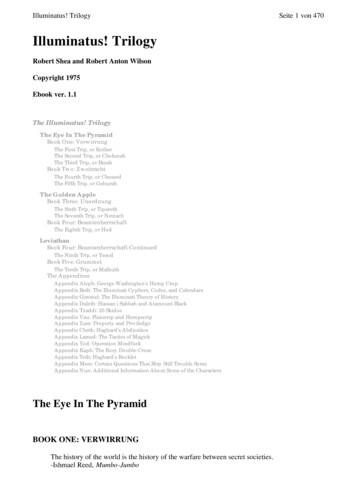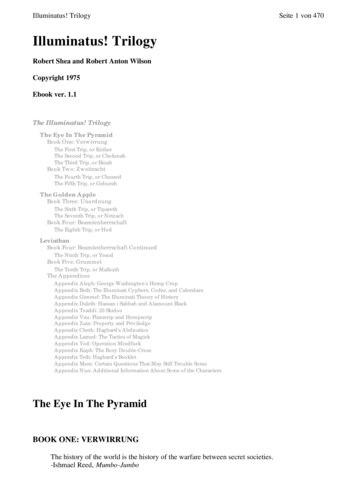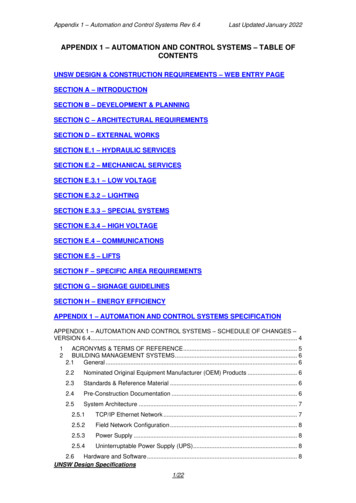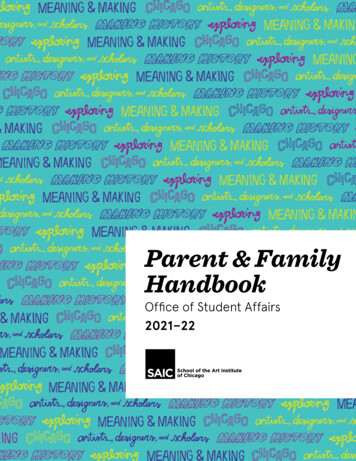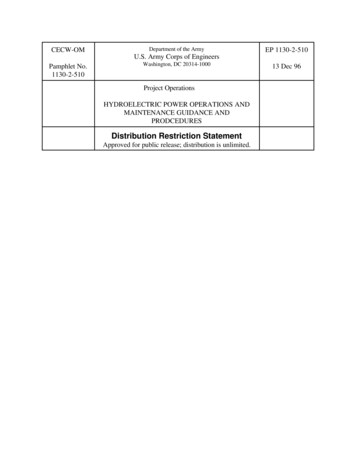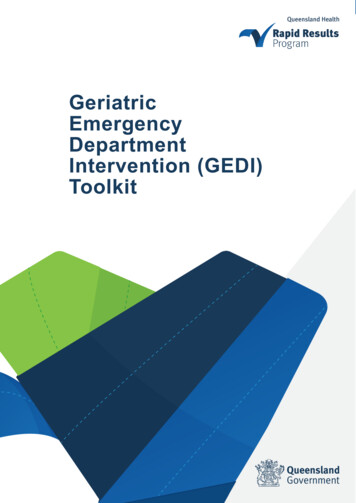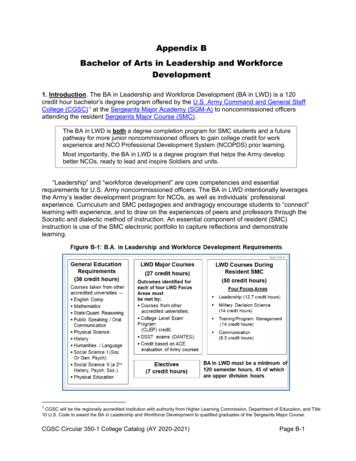
Transcription
Appendix BBachelor of Arts in Leadership and WorkforceDevelopment1. Introduction. The BA in Leadership and Workforce Development (BA in LWD) is a 120credit hour bachelor’s degree program offered by the U.S. Army Command and General StaffCollege (CGSC) 1 at the Sergeants Major Academy (SGM-A) to noncommissioned officersattending the resident Sergeants Major Course (SMC).0FThe BA in LWD is both a degree completion program for SMC students and a futurepathway for more junior noncommissioned officers to gain college credit for workexperience and NCO Professional Development System (NCOPDS) prior learning.Most importantly, the BA in LWD is a degree program that helps the Army developbetter NCOs, ready to lead and inspire Soldiers and units.“Leadership” and “workforce development” are core competencies and essentialrequirements for U.S. Army noncommissioned officers. The BA in LWD intentionally leveragesthe Army’s leader development program for NCOs, as well as individuals’ professionalexperience. Curriculum and SMC pedagogies and andragogy encourage students to “connect”learning with experience, and to draw on the experiences of peers and professors through theSocratic and dialectic method of instruction. An essential component of resident (SMC)instruction is use of the SMC electronic portfolio to capture reflections and demonstratelearning.1CGSC will be the regionally accredited institution with authority from Higher Learning Commission, Department of Education, and Title10 U.S. Code to award the BA in Leadership and Workforce Development to qualified graduates of the Sergeants Major Course.CGSC Circular 350-1 College Catalog (AY 2020-2021)Page B-1
2. Relationship between the BA in Leadership and Workforce Development (BA in LWD)and the Sergeants Major Course (SMC) delivered by the Sergeants Major Academy.As reflected in the diagram on the previous page, BA in Leadership and WorkforceDevelopment students complete 36 hours of General Education Requirements, 27hours ofLeadership and Workforce Development Major Requirements, and 7 hours of electives outsideSergeants Major Course attendance. The “resident phase” of a BA in LWD is twenty-one LWDcourses (50 credit hours) carefully constructed using specific lessons and assessments from theten-month Sergeants Major Course at Fort Bliss, TX, which, since 1972, has been the Army’spremier leader development experience for senior noncommissioned officers.Sergeants Major Course (SMC) outcomes and lesson objectives are carefully nested withNoncommissioned Officer Professional Development System (NCOPDS) leader competenciesand attributes maintained by the Noncommissioned Officer Leadership Center of Excellence atFort Bliss. Sergeants Major Course outcomes and learning objectives are shaped by years of inputfrom the operational Army, Sergeants Major Academy (SGM-A) faculty, SMC students, and SMCalumni serving as senior leaders in military formations around the world.BA in Leadership and Workforce Development program learning outcomes are fully nestedwith Sergeants Major Course outcomes. As reflected immediately below, the BA in LWDappropriates five of the seven SMC outcomes, and adds a sixth.Sergeants Major Course (SMC) OutcomesApproved for AY 2020-2021Graduates of the Sergeants Major Course:BA in Leadership and Workforce Development(BA in LWD) Program OutcomesGraduates with a BA in LWD:Outcomes’ Alignment w/LWD Focus Areas----(1) Are prepared to assume war fighting duties(2) Understand the leadership and managementrequirements to supervise, train, and lead anenlisted force.(1) Understand the leadership and managementprinciples to supervise, train, and lead an enlistedforce.(3) Understand the profession-of-arms principlesnecessary to interpret, implement, model andcorrect professional military attributes.------- Leadership Training / ProgramManagement----(4) Are skilled in communication and capable ofeffectively communicating critical information toreach a shared understanding of issues andsolutions.(2) Are skilled in communication and capable ofeffectively communicating critical information toreach a shared understanding of issues andsolutions.(5) Are attuned to the complexity of the operatingenvironment and consider the impact of culture onmilitary operations and take a systems approachto meeting organization and strategic-levelleadership challenges.(3) Are attuned to the complexity of the operatingenvironment and consider the impact of culture onmilitary operations and take a systems approachto meeting organization and strategic-levelleadership challenges.(6) Are critical and creative thinkers who canadapt to operate critically, strategically, and jointlyin complex and ambiguous environments.(4) Are critical and creative thinkers who canadapt to operate critically, strategically, and jointlyin complex and ambiguous environments. Leadership(7) Are self-aware and motivated to continuelearning and improving throughout their careers.(5) Are self-aware and motivated to continuelearning and improving throughout their careers. Leadership(6) Demonstrate the capacity to integrateconcepts from leadership, training / programmanagement, military decision science, andcommunications. (LWD Capstone / e-Portfolio) Leadership----CGSC Circular 350-1 College Catalog (AY 2020-2021) Communications LWD Gen Ed Requirements Military Decision Science LWD Gen Ed Requirements Military Decision Science LWD Gen Ed Requirements LWD Capstone Course Training / Program Mgmt. Military Decision Science CommunicationsPage B-2
Both SMC outcomes and BA in LWD outcomes are annually reviewed by the SGM-AEducation Council, co-chaired by the CGSC Assistant Dean at SGM-A and the Director, SergeantsMajor Course. Members of the Education Council include the chairs and vice chairs from allSergeants Major Course teaching departments, and curriculum developers working for the SMC’sChief of Education. Each year, the SGM-A Commandant formally presents BOTH the SergeantsMajor Course and the BA in Leadership and Workforce Development program purpose, outcomes,and terminal learning objectives to the CGSC Commandant for approval for the coming academicyear. The CGSC and SGM-A Accountable Instructional System (AIS) within which this occurs isexplained in greater detail in Chapter 6 (CGSC Processes Bearing on Educational Quality), inCGSC Bulletin 930 CGSC Curriculum Development (AIS).3. General Education Requirements.General education (GE) requirements for the BA in Leadership and WorkforceDevelopment are designed to broaden students’ perspectives. Degree candidates mustcomplete thirty-six (36) credit hours of general education from other regionally-accreditedinstitutions. 21FBA in LWD General Education Requirements 3 are as follows:2FEnglish Composition6 hoursMathematics3 hoursStatistics / Quantitative Reasoning3 hoursPublic Speaking / Oral Communication 3 hoursPhysical Science3 hoursEthical Reasoning3 hoursHistory3 hoursHumanities or Modern Language3 hoursSocial Science I (Intro to Sociologyor General Psychology)3 hoursSocial Science II (may be an additionalHistory, Psychology, or Sociology course)3 hoursPhysical Education (BCT or transfer)3 hours36 hoursDegree candidates must meet credit hour minimums for each GE topic area listed above. Thelearning outcomes listed below are provided to assist Soldiers, education center counselors, SGM-Aeducation counselors, and the CGSC Registrar’s Office evaluate other universities’ general educationcourses against CGSC BA in LWD requirements. Courses listed in university catalogs as corecurriculum classes will generally transfer to CGSC for the BA in LWD.CGSC will not offer undergraduate “gen. ed.” courses to meet the BA in LWD requirements listed above. A degreecandidate must do general education coursework at a regionally-accredited civilian institution of his or her choice.3 Army University and CGSC will establish a list of specific courses from partner universities that automatically meet BAin LWD general education requirements. The CGSC Registrar’s Office will maintain this list on the BA in LWD publicwebsite for easy access by Soldiers and Army Education Center counselors.2CGSC Circular 350-1 College Catalog (AY 2020-2021)Page B-3
3.a. English Composition (6 credit hours)Learning Outcomes:Sample Course Titles Include: Apply basic skills and knowledge forEnglish writing to craft essays and researchpapers;English Composition I Apply various writing formats tounderstand and communicate ideas tospecific audiences; andIntroduction to Research Writing Apply critical-thinking skills to all stepsof process writing to differentiate amonginadequate, adequate, and superiorpresentation of ideas.English Composition IIIntroduction to Technical WritingComposition and RhetoricAlso:CLEP Exam College Composition3.b. College Mathematics (3 credit hours)Learning Outcomes:Sample Course Titles Include: Interpret mathematical modelsgiven verbally, or by formulas, graphs,tables, or schematics, and drawinferences from them;College Algebra Recognize and use connectionswithin mathematics and betweenmathematics and other disciplines; Employ quantitative methods suchas, arithmetic, algebra, geometry, orstatistics to solve problems.College GeometryIntroduction to StatisticsCalculusBusiness MathAlso:CLEP Exam College Mathematics3.c. Qualitative and Quantitative Reasoning (3 credit hours)Learning Outcomes:Sample Course Titles Include: Understand and describe theimportance of logical and empiricalmethods to determine and expressrelationships between properties orconcepts;Critical/Creative Thinking Apply basic skills and knowledge usingappropriate methods for gathering,analyzing and displaying data to drawconclusions; andCritical ReasoningQualitative Analysis and ReasoningQuantitative Analysis and Reasoning Solve complex, real-world problemsthrough the application of appropriatestrategies and the use of logical reasoningskills.CGSC Circular 350-1 College Catalog (AY 2020-2021)Page B-4
3.d. Public Speaking / Oral Communication (3 credit hours)Learning Outcomes:Sample Course Titles Include: Develop proficiency in oral discourse;Public Speaking Evaluate an oral presentation accordingto established criteria; andArgumentation and Debate Research a topic, develop an argument,and organize supporting detailsSpeech CommunicationsAlso:DSST Test Principles of Public Speaking3.e. Natural /Physical Science (3 credit hours)Learning Outcomes:Sample Course Titles Include: Understand major concepts and factsrelated to the study of living systems andthe physical universe;General Biology Apply scientific facts and ideas to realworld problems; andGeneral Physics Develop a beginning understanding ofsocial, practical, and ethical significance ofscientific knowledge and theory.General ChemistryPhysical SciencePhysical GeologyGeneral Astronomy3.f. Ethical Reasoning (3 credit hours)Learning Outcomes:Sample Course Titles Include: Exhibit awareness and understanding ofethical dilemmas and standards forresolution of ethical questions;Effective Personal Ethics Apply emerging skills to address ethicaldilemmas; andEthics and Social Responsibility Recognize and articulate the importanceof social responsibility as an essentialcomponent of ethical reasoning.Business EthicsAlso:DSST Test “Ethics in America”CGSC Circular 350-1 College Catalog (AY 2020-2021)Page B-5
3.g. Historical Perspectives (3 credit hours)Learning Outcomes:Sample Course Titles Include: Understand how past events andactions have influenced current events;American History Understand that knowledge is not fixedand that human beings continue toreinterpret the past based on currentperspectives; and Identify and describe appropriatesystematic and scientific strategies toexamine history.World HistoryHistory of ReligionWestern CivilizationEuropean CivilizationAfrican CivilizationAlso:CLEP Test “History I or II”CLEP Test “Western Civ. I or II”3.h. Humanities or Modern Language (3 credit hours)Learning Outcomes:Sample Course Titles Include: Acquire knowledge of the conventionsand methods of at least one of thehumanities in addition to thoseencompassed by other knowledge areasrequired by the general educationprogram; andAny Foreign language I-IVIntroduction to Art AppreciationAny World Culture ClassMusic AppreciationReligious StudiesUrban StudiesAlso:CLEP Language TestDSST Test “Intro to World Religions” Demonstrate basic proficiency in theunderstanding and use of a foreignlanguage.3.i. Social Science (3 credit hours)Learning Outcomes:Sample Course Titles Include: Explore ways in which individuals,groups, institutions, governments and/orsocieties behave and influence oneanother. Exhibit an understanding of the varioussocial factors that influence. Identify and describe appropriatesystematic and scientific strategies toexamine current social issues andproblems.PsychologySociologyPhilosophyEthnic StudiesGender StudiesGlobal Social IssuesEthicsAlsoCLEP Social Science TestsCGSC Circular 350-1 College Catalog (AY 2020-2021)Page B-6
The links below are to GE requirements for CGSC Cooperative Degree Program ate.edu/kstate8/lists/The links below are for TX, GA, NY state-mandated GE 4. Additional Pre-SMC Requirements fall into two categories: (a) LWD Core Requirements(27 credit hours); and (b) Electives (7 credit hours).4.a. LWD Major Requirements (27 credit hours). Degree candidates meet LWD Majorrequirements under each of the program’s four focus areas (Leadership, Decision Sciences,Program Management, and Communication) in some combination of the following: (1) Courseworkcompleted at other accredited universities; (2) the College Level Examination Program (CLEP)where the candidate scored 50 or higher; (3) DSST tests (formally DANTES standardized tests)with passing scores consistent with ACE guidelines; and (4) credit awarded based on ACErecommendations for Army coursework.LWD Major Requirements are as follows:4.a.(1)(a) Individual Leadership (6 credit hours)Learning Outcomes:Sample Course Titles Include: Recognize a variety of leadershiptheories;Intro to Leadership Demonstrate the ability to use theoriesin the practice of leadership; Understand how to lead with integrity; Demonstrate a practice of ethicalleadership.Leadership Case StudiesMoral and Ethical LeadershipAlso:DSST Test (Principles of Supervision)Competency Based AssessmentACE Credit4.a.(1)(b) Organizational Leadership (6 credit hours)Learning Outcomes:Sample Course Titles Include: Analyze individual and group behavior;Organizational Behavior Understand the implications oforganizational behavior on the processof management; andOrganizational Design and Behavior Describe and assess the basic designelements of organizational structure.Organizational Change ManagementAlso:DSST Test Organizational BehaviorCompetency Based AssessmentACE CreditCGSC Circular 350-1 College Catalog (AY 2020-2021)Page B-7
4.a.(2) Decision Science (6 credit hours) Understand complex problem-solving;Sample Course Titles Include: Understand the use of quantitativeand qualitative methods in decisionmaking; andQualitative/Quantitative Decision Making Demonstrate the ability to useestablished decision-makingmethodologies.Managing DecisionsPolicy AnalysisAlso:Competency Based AssessmentACE Credit4.a.(3) Program Management (6 credit hours) Conduct Program Design;Sample Course Titles Include: Demonstrate knowledge of complexprogram development; andIntro to Program Management Conduct Project Planning andIntegration.Program Planning and DesignProgram/Project Management andLeadershipAlso:DSST Test Principles of SupervisionCompetency Based AssessmentACE Credit4.a.(4) Communications Skills (3 credit hours)Learning Outcomes: Display competence in oral, written,and visual communication; Identify, evaluate and suggestsolutions to problems encounteredin group communication; and Assess and articulate appropriatelistening responses for a variety ofsituations/context.Sample Course Titles Include:Intro to CommunicationsLeadership CommunicationsData VisualizationAlso:Competency Based AssessmentACE Credit4.b. LWD Electives (7 credit hours). The CGSC Registrar will accept up to 10 semester hoursfrom other regionally accredited institutions as “free electives” toward meeting the 120 credit hourrequirement for a BA in Leadership and Workforce Development.CGSC Circular 350-1 College Catalog (AY 2020-2021)Page B-8
Upon selection to attend the Sergeants Major Course, a NCO may formally petition the CGSCRegistrar to: (a) accept credit hours from completed courses offered by other regionally-accreditedinstitutions; and (b) audit that NCO’s academic record for entry into the resident phase of the BA inLWD.Should this audit identify credit hour gaps in pre-SMC preparation, a counselor will work withthat NCO to identify options for additional credit. This will be particularly important in the early yearsof program implementation.5. Resident SMC Course Requirements. The 50 credit hour resident portion of the BA inLeadership and Workforce Development is completed during the ten month resident SergeantsMajor Course delivered by the Sergeants Major Academy on Fort Bliss, TX. 43FThe resident LWD curriculum is clustered under four Focus Areas: Leadership, MilitaryDecision Science, Training Program Management, and Communication Skills.Resident SMC Portion of the BA in Leadership and Workforce DevelopmentFocus Area I: Leadership (12.7 credit hours)LWD Course I-1LWD Course I-2LWD Course I-3LWD Course I-4LDW Course I-5LWD Course I-6LWD Course I-7Workplace Ethics (0.8 credit hour)Leading and Developing Organizations (3.1 credit hours)Building High Performance Teams (1.8 credit hours)Empowering Others to Lead Using Disciplined Initiative (0.9 credithour)Coaching and Mentoring (2.5 credit hours)Sustaining Organizational Capacity (Personnel and Material) (2.7 crhrs)Human Resource Management Processes and Systems (0.9 credithour)Focus Area II: Military Decision Science (14 credit hours)LWD Course II-1LWD Course II-2LWD Course II-3LWD Course II-4Strategic Planning I: Solving Complex Problems (1.0 credit hour)Strategic Planning II: Understanding Culture and Context (1.9 credithrs)Strategic Planning III: Processes and Systems (8.1 credit hours)Strategic Planning IV: MDS Block Assessment (3.0 credit hours)Focus Area III: Training Program Management (14 credit hours)LWD Course III-1LWD Course III-2LWD Course III-3LWD Course III-4LWD Course III-5LWD Course III-6LWD Course III-7Managing Effective Training 0.8 credit hour)Adult Learning and Instruction Techniques (5.6 credit hours)Safety and Risk Management (1.1 credit hour)Sustaining a Values-Based Culture (0.9 credit hour)Building Resilience in Others (2.8 credit hours)Physical Wellness Program Management (0.9 credit hour)Work Measurement and Efficiency (1.9 credit hours)From the Higher Learning Commission’s perspective, SGM-A on Fort Bliss is a “branch campus” of the US ArmyCommand and General Staff College at Fort Leavenworth, KS, for purposes of offering the BA in LWD. Follow thishyperlink to see HLC and federal definitions of “branch campus.”4CGSC Circular 350-1 College Catalog (AY 2020-2021)Page B-9
Focus Area IV: Communication Skills (9.3 credit hours)LWD Course IV-1LWD Course IV-2LWD Course IV-3Writing and Presentation Skills Development (1.1 credit hour)Writing and Analytical Skills Assessment (5.4 credit hours)LWD Course Capstone (2.8 credit hours)Resident BA in LWD Courses: (50 credit hours)Pages B-10 through B-16 provide LWD Course Descriptions and Course Outcomes, as well asthe specific SMC lessons that constitute each LWD Course.Focus Area I: Leadership(7 LWD Courses / 12.7 undergraduate credit hours)LWD Course I-1: “Workplace Ethics”(1 u.g. credit hour / 0.8 contact hours)(a) Course Description: In this course students examine ethics in the workplace and the role oforganizational leaders in fostering ethical behavior. Using case studies, small group discussionin the classroom and large group discussion with a military ethics counselor or military chaplain,self-assessment exercises, and reading assignments students explore the basic frameworks ofethical dealings and moral leadership. This course emphasizes moral, ethical, and socialresponsibilities of organizational leaders and the linkage of responsibilities organizationalleadership behavior and decision-making.(b) Course Outcome(s): Analyze how Senior-level leaders assist in the development of ethicalorganizations and leaders to achieve results by integrating ethical leadership competencies andexperience into an organizational-level leadership position.(c) Course Components: (1 lesson in the AY 2020-2021 SMC curriculum) SMC-DPS-L107 Army Leadership and Profession (13 contact hours)LWD Course I-2: “Leading and Developing Organizations”(3.1 undergraduate credit hours / 50 contact hours)(a) Course Description: This course will use case studies, models and the examination of doctrine toexpose students to the study of power and influence, ethics, and the principles and complexdynamics of organizational leadership. Students will gain an understanding of the necessaryleadership attributes and competencies required to effectively lead, build and develop individuals,teams and organizations.(b) Course Outcome(s): Analyze leadership competencies and attributes, and lifelong learningstrategies to equip students to identify when change is necessary and to exercise power andinfluence to achieve change while conducting day-to-day operations.(c) Course Components: (12 lessons in the AY 2020-2021 SMC curriculum – see below): SMC-DPS-L200 Developing Organizations and Leaders (3 contact hours)SMC-DCL-L202 Leader Development (5 contact hours)SMC-DCL-L201 Organizational Power and Influence (4 contact hours)SMC-DCL-L212 Implementing an Organizational Vision (4 contact hours)SMC-DCL-L205 Leading Organizations in Change (3 contact hours)SMC-DCL-L206 Building Organizational Teams (5 contact hours)SMC-DCL-L207 Developing Learning Organizations (3 contact hours)CGSC Circular 350-1 College Catalog (AY 2020-2021)Page B-10
SMC-DCL-L208 Developing Ethical Organizations (9 contact hours)SMC-DCL-L306 Organizational Leadership Philosophy (6 contact hours)SMC-DCL-L210 Organizational Culture and Climate (3 contact hours)SMC-DPS-L211 Organizational Stress (2 contact hours)SMC-DCL-L304 Leadership and Moral Courage (3 contact hours)LWD Course I-3: “Building High Performance Teams”(1.8 u.g. credit hours / 28 contact hours)(a) Course Description: In this course, students will examine the dynamics of the operationalenvironment in order to build effective teams. The students will analyze various case studies tounderstand the diversity of organizations in order to set conditions and blend diverse groupsinto effective organizational level teams.(b) Course Outcome(s) Analyze the aspects of teambuilding, group dynamics, command influence,and the various forms of servant leadership in an organization.(c) Course Components: (5 lessons in the AY 2020-2021 SMC curriculum): SMC-Found-P930.02 Teambuilding: Group Process (12 contact hours) SMC-Found-P930.03 Teambuilding: Group Dynamics (3 contact hours) SMC-DCL-L203 Servant Leadership (4 contact hours) SMC-DCL-L213 Influencing Outside Organizations (6 contact hours) SMC-DPS-L301 Leadership and Mission Command (3 contact hours)LWD Course I-4: “Empowering Others to Lead Using Disciplined Initiative”(0.9 u.g. credit hour / 15 contact hours)(a) Course Description: In this course, students will learn how to enable disciplined initiative withinthe commander’s intent to empower agile and adaptive leaders.(b) Course Outcome(s): Analyze the aspects of disciplined initiative.(c) Course Components: (2 lessons in the AY 2020-2021 SMC curriculum) SMC-DAO-O101 Unified Land Operations (3 contact hours) SMC-DAO-O109 Mission Command (12 contact hours)LWD Course I-5: “Coaching and Mentoring”(2.5 u.g. credit hours / 40 contact hours)(a) Course Description: In this course, students will analyze the results of various self-assessmenttools designed to improve human performance. The student will experience multiple mentoringsessions that will focus on identifying possible root causes of performance issues, which maygo beyond a lack of skills and knowledge. Using various self-assessment tools designed toimprove human performance, students will participate in multiple mentoring sessions to identifyprofessional and personal goals. From these sessions students will develop a plan of action toachieve these goals and develop skills necessary to serve as an effective mentor tosubordinates.(b) Course Outcome(s): At the completion of this course the student will become a successful andeffective leader and build coaching and mentoring skills(c) Course Components: (1 lesson in the AY 2020-2021 SMC curriculum): SMC-Foundations-P930.18 Coaching and Student Feedback (40 contact hours)CGSC Circular 350-1 College Catalog (AY 2020-2021)Page B-11
LWD Course I-6: “Sustaining Organizational Capacity (Personnel and Material)”(2.7 u.g. credit hours / 43 contact hours)(a) Course Description: In this course, students will examine the primary systems, concepts, andissues of organizational change. As executive management leaders, they will learn to lead,manage, and affect or implement change.(b) Course Outcome(s): At the end of this course students will gain the skillset to implementchange management and strategy to operate in a complex environment.(c) Course Components: (8 lessons in the AY 2020-2021 SMC curriculum): SMC-DFM-F100 Force Management Analysis (1 contact hour) SMC-DFM-F101 Strategic Change (8 contact hours) SMC-DFM-F103 Developing Army Organizational Capability (6 contact hours) SMC-DFM-F104 Planning, Programming, Budgeting, and Execution and Total Army Analysis (6contact hours) SMC-DFM-F105 Developing Materiel Capabilities (3 contact hours) SMC-DFM-F106 Manning the Army (4 contact hours) SMC-DFM-F107 Sustainable Readiness (3 contact hours) SMC-DFM-F108 Force Management White Paper (12 contact hours)LWD Course I-7: “Human Resource Management Processes and Systems”(0.9 u.g. credit hour / 15 contact hours)(a) Course Description: This course focuses on the theory, methodology and application of humanresource planning and development techniques, staffing analysis and planning, careermanagement, management succession and development, and performance improvement.(b) Course Outcome(s): Analyze the US Army’s Human Resource (HR) doctrine, support concepts,systems, and organizational structures while grasping a broad understanding of HR operationsby exploring the basic tenets of human resource support, the structure, and organizationsinvolved in delivering that support, as-well-as emerging military and civilian HR support.(c) Course Components: (1 lesson in the AY 2020-2021 SMC curriculum): SMC-DPS-S301 Human Resource Management Processes and Systems (15 contact hours)Focus Area II: Military Decision Science (MDS)(4 LWD Courses / 14 undergraduate credit hours)LWD Course II-1: “Strategic Planning I: Solving Complex Problems”(1.0 u.g. credit hour / 16 contact hours)(a) Course Description: This course focuses on the use of critical and creative thinking whileapplying operational and mission variables, in order to identify and solve complex problems,through a logical decision-making process.(b) Course Outcome(s): Analyze the aspects of critical and creative thinking, problem solving, andconducting assessments in the operational environment.(c) Course Components: (4 lessons in the AY 2020-2021 SMC curriculum): SMC-DCL-L103 Introduction to Critical Thinking and Problem Solving (5 contact hours) SMC-DCL-L104 Creative Thinking, Logic, and Decision Making (5 contact hours) SMC-DCL-L105 Assessments (4 contact hours) SMC-DAO-O104 Operational and Mission Variables (2 contact hours)CGSC Circular 350-1 College Catalog (AY 2020-2021)Page B-12
LWD Course II-2: “Strategic Planning II: Understanding Culture and Context”(1.9 u.g. credit hours / 30 contact hours)(a) Course Description: In this course, students will use case studies, classroom discussions andthe examination of doctrine to explore the impact of judgement, ethics and Civil MilitaryRelations on the actions of an organizational leader operating within the context of a strategicenvironment.(b) Course Outcome(s): Understand the Constitutional basis for civil-military relations; comparingand contrasting civil-military relations theories for application in real world situations.(c) Course Components: (7 lessons in the AY 2020-2021 SMC curriculum): SMC-DPS-L110 American Civil Military Relations (4 contact hours) SMC-DCL-L302 Leadership and Ethics in War (3 contact hours) SMC-DCL-L303 Leadership and Decision Making (2 contact hours) SMC-DPS-L308 Leadership in Irregular Warfare (2 contact hours) SMC-DJIIMO-J300 Operational Art and Design (7 contact hours) SMC-DJIIMO-J400 Strategic Estimate (8 contact hours) SMC-DJIIMO-J502 Command & Control C2, and Intelligence (4 contact hours)LWD Course II-3: “Strategic Planning III: Processes and Systems”(8.1 u.g. credit hours / 130 contact hours)(a) Course Description: In this course, using discussion and collaboration, students will examinethe Joint and Army Operations processes using the Command Post of the Future (CPOF) inorder to explore the Army Design Methodology (ADM), the Military Decision Making Process(MDMP), the Joint Intelligence Preparation of the Operational Environment (JIPOE) processand the transitioning of functions from operational to strategic staff personnel.(b) Course Outcome(s): Analyze the aspects of military planning processes and systems.(c) Course Components: (8 lessons in the AY 2020-2021 SMC curriculum) SMC-DAO-O112
Bachelor of Arts in Leadership and Workforce Development . 1. Introduction. The BA in Leadership and Workforce Development (BA in LWD) is a 120 credit hour bachelor's degree program offered by the U.S. Army Command and General Staff College (CGSC) 0F 1 at the Sergeants Major Academy (SGM-A) to noncommissioned officers
